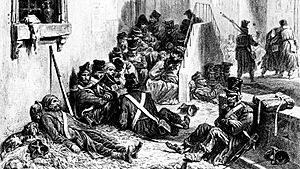Siege of Mainz (1814) facts for kids
The Siege of Mainz was a long battle that happened from January 3 to May 4, 1814. It took place during the time of the Napoleonic Wars, a big conflict in Europe. This siege involved French soldiers defending the city of Mainz against armies from Russia and other German states.
Quick facts for kids Siege of Mainz (1814) |
|||||||
|---|---|---|---|---|---|---|---|
| Part of the Campaign of France | |||||||
 French soldiers fell ill with typhus. |
|||||||
|
|||||||
| Belligerents | |||||||
| Commanders and leaders | |||||||
| Strength | |||||||
| 31,000 46 guns |
30,000 | ||||||
| Casualties and losses | |||||||
| 19,000 | Unknown | ||||||
The French army, led by General Charles Antoine Morand, was trapped inside the strong Mainz Fortress. At first, Russian soldiers, led by General Louis Alexandre Andrault de Langeron, surrounded the city. Later, in February 1814, German soldiers took over the siege. These German troops came from places like the Duchy of Berg and the Duchy of Nassau. They were led by Duke Ernest of Saxe-Coburg.
The French army inside Mainz was very strong. The attacking forces could not directly storm the fortress. Instead, they had to wait and try to starve the French out.
A Hidden Enemy: Typhus
During the siege, a terrible sickness called typhus spread through Mainz. This disease caused many soldiers and people in the city to become very ill. It was a bigger threat than the enemy soldiers. Despite the widespread sickness, General Morand and his troops held on. They did not give up the city.
The siege finally ended when important news arrived. Napoleon, the emperor of France, had given up his power. Once this news reached Mainz, General Morand agreed to surrender the city.
What Happened Next
The siege had a devastating effect on the French soldiers. At the start, there were about 31,000 men defending Mainz. By the end, only 12,000 of them were still alive. Most of these deaths were not from fighting. They were caused by the terrible typhus epidemic that swept through the city.
 | Delilah Pierce |
 | Gordon Parks |
 | Augusta Savage |
 | Charles Ethan Porter |

